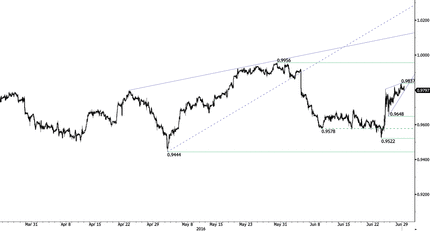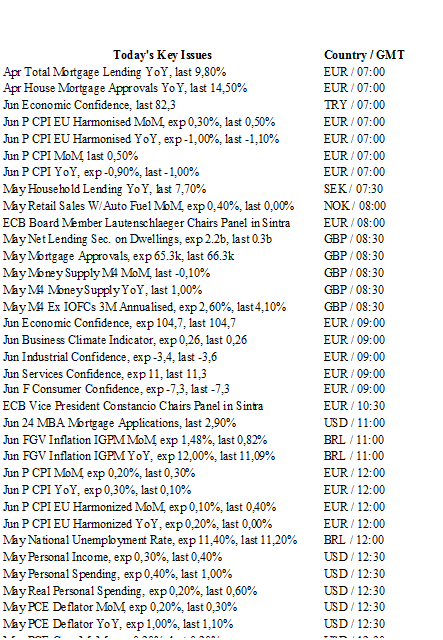EM Currencies Strengthen On Low U.S. Rate Prospect
Swissquote Bank Ltd | Jun 29, 2016 08:36AM ET
Forex News and Events
BCB released its quarterly inflation forecast (by Arnaud Masset)
Yesterday, the Brazilian central bank (BCB) released its quarterly inflation report and updated its inflation and growth forecast. The BCB’s 2016 inflation forecast was revised higher to 6.9%, compared to 6.6% in the March report. However, the central bank now expects inflation to rise 4.7% by year-end 2017, compared to 4.9% in the previous report.
On the growth side, the institution revised higher its GDP forecast, seeing now a contraction of only -3.3% in 2016 compared to -3.5% three months earlier.
All in all, the central bank has not yet won its struggle against rampant inflation as it struggles to bring it back within the 2.5% to 4.5% target band. However, Ilan Goldfajn, the BCB’s new Governor, appeared confident that the central bank would be able to lower inflation to the centre of the official target range at 4.5% by the second half of 2018.
He stated, during the press conference, that this goal “is both ambitious and credible”. The governor also added that the success of the bank’s monetary policy will largely depend on the implementation of fiscal and economic adjustments.
For now, the BCB has the market’s trust, thanks to Goldfajn’s predecessor, Alexandre Tombini, who fought to restore the bank’s credibility. The market is expecting inflation to reach 7.29% by year-end and does not expect any cut in the Selic this year - currently at 13.25%., according to the results of the weekly economic survey released on Monday.
The Brazilian real recovered strongly in São Paulo yesterday on the prospect of a longer period of low interest rate in the US and across the globe. Risky assets such as equities rallied strongly, while EM currencies strengthen. With the Fed almost surely sidelined until the end of the year, investors will start paying more attention to local developments in Brazil. Therefore, developments in the political landscape will likely trigger short-term reactions in the FX and rate market again. USD/BRL eased to 3.3032 yesterday, the lowest level since July last year, and should continue to do so as Brexit fears continue to ease.
Fraught European banks bearing the brunt of Brexit uncertainty (by Yann Quelenn)
Banks have definitely been the biggest losers since the Brexit vote. Other than British banks, European banks are still in the eye of the storm. Some German and many Italian banks have experienced sharp declines in their market capital since the vote.
Deutsche Bank (DE:DBKGn) and Commerzbank (DE:CBKG) took a beating on Friday but not as much as Unicredit (DE:CRIH), which has so far lost around 30%. Some banks lost due to their heavy involvement and presence in the UK, while for others it is a direct result of the growing uncertainty surrounding the future of the EU.
Even if it remains an unlikely prospect at the moment we believe that the market has already begun to price in a potential dislocation of the EU. This is particularly true for Italy, where the ongoing underlying difficulties faced by its banking sector would not be sustainable without EU support. The true nature of the Italian banking system risks being exposed, revealing that it may in fact be bankrupt. For the time being, a bailout from the EU seems absolutely necessary.
Italian banks are far from being the only ones to suffer. German banks are also facing major difficulties. Over the last few days, George Soros took a massive bet against Deutsche Bank as did some hedge funds. As a result, the ongoing market uncertainties are reflected by the banks share price and we believe that further stimulus will be added by the ECB in an attempt to mitigate these uncertainties. For the foreseeable future the currency war will rage on spelling eventual upside pressures for the Swiss franc.
USD/CHF - Buying Pressures Start To Fade.


The Risk Today
Yann Quelenn
EUR/USD is now slightly pushing higher after the big turmoil on the Brexit "leave" vote. Hourly support is given at 1.0971 (27/06/2016 low) while hourly resistance is located at 1.1112 (28/06/2016 high). Strong resistance is given at 1.1479 (06/05/2016 high). Sharp moves do not have to be ruled out to further consolidate as there are still a lot of volatility on the market. In the longer term, the technical structure favours a very long-term bearish bias as resistance at 1.1714 (24/08/2015 high) holds. The pair is trading in range since the start of 2015. Strong support is given at 1.0458 (16/03/2015 low). However, the current technical structure since last December implies a gradual increase.
GBP/USD is trading mixed amid the Brexit "leave" vote despite. Volatility remains strong. Hourly support lies at 1.3121 (27/06/2016 low) and hourly resistance is given at 1.3419 (28/06/2016 high). Expected to further consolidate. The long-term technical pattern is negative and favours a further decline. Key support at 1.3503 (23/01/2009 low) has been broken, as long as prices remain below the resistance at 1.5340/64 (04/11/2015 low see also the 200-day moving average).
USD/JPY is increasing, even though slowly. The technical structure continues to favour a second leg lower. Hourly support is given at 99.02 (24/06/2016 low) while hourly resistance is given at 102.83 (28/06/2016 high). Expected to further consolidate. We favour a long-term bearish bias. Support is now given at 96.57 (10/08/2013 low). A gradual rise towards the major resistance at 135.15 (01/02/2002 high) seems absolutely unlikely. Expected to decline further support at 93.79 (13/06/2013 low).
USD/CHF's upside move is now fading. Hourly resistance is given at 0.9837 (28/06/2016 high). The road is nonetheless wide-open to further resistance at 0.9920 (03/06/2016 high). Hourly support is given at 0.9648 (24/06/2016 low). In the long-term, the pair is still trading in range since 2011 despite some turmoil when the SNB unpegged the CHF. Key support can be found 0.8986 (30/01/2015 low). The technical structure favours a long term bullish bias since last December.
Trading in financial instruments and/or cryptocurrencies involves high risks including the risk of losing some, or all, of your investment amount, and may not be suitable for all investors. Prices of cryptocurrencies are extremely volatile and may be affected by external factors such as financial, regulatory or political events. Trading on margin increases the financial risks.
Before deciding to trade in financial instrument or cryptocurrencies you should be fully informed of the risks and costs associated with trading the financial markets, carefully consider your investment objectives, level of experience, and risk appetite, and seek professional advice where needed.
Fusion Media would like to remind you that the data contained in this website is not necessarily real-time nor accurate. The data and prices on the website are not necessarily provided by any market or exchange, but may be provided by market makers, and so prices may not be accurate and may differ from the actual price at any given market, meaning prices are indicative and not appropriate for trading purposes. Fusion Media and any provider of the data contained in this website will not accept liability for any loss or damage as a result of your trading, or your reliance on the information contained within this website.
It is prohibited to use, store, reproduce, display, modify, transmit or distribute the data contained in this website without the explicit prior written permission of Fusion Media and/or the data provider. All intellectual property rights are reserved by the providers and/or the exchange providing the data contained in this website.
Fusion Media may be compensated by the advertisers that appear on the website, based on your interaction with the advertisements or advertisers.